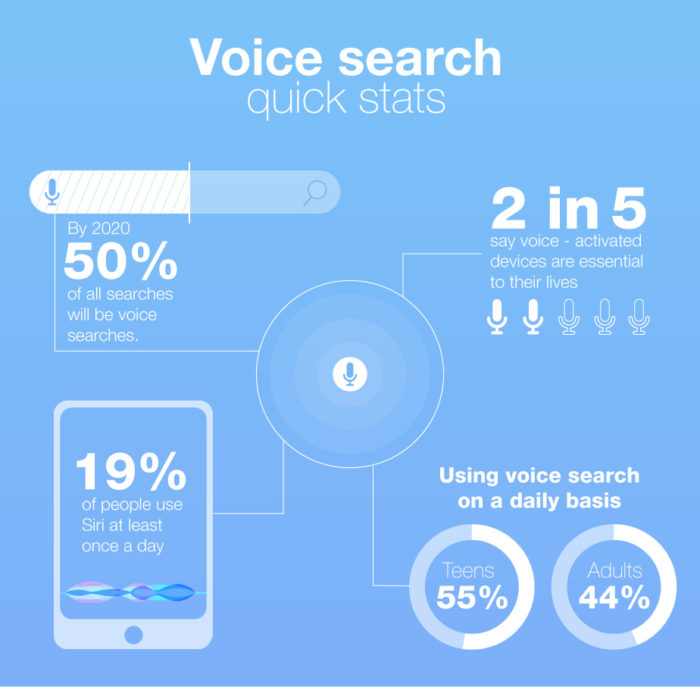Technology has developed at an incredibly fast pace in the last couple of years. With multiple examples ranging from the automotive industry to a simpler “home usage”, it’s easy to say that tools which were only imagined in science fiction movies are coming towards us. The article covers tips to optimize WordPress websites for voice search.
Examples like “Amazon Echo” and all the Voice-related technologies are indeed the reason why voice-controlled technologies have become one of the biggest focuses in both the development field and in a business-related one. Let’s analyse the subject in more detail.
Table of Contents
Voice Search: A Technology of Future

Voice search has seen a 23% increase in both investments and building assets. This is due to the fact that, generally, voice controls apply to every possible business segment: you can, in fact, control your car’s infotainment, your house’s lights, your pc, your phone by simply using your voice.
Siri was the first “mainstream” voice assistant which actually launched the topic into the market. In fact, since October 2011 (Siri’s launch month) the voice search and control topic started to gather a lot of interest in triple-A companies, like Google, for example. With all these details in mind, it’s quite easy to understand why voice search and voice search optimization is so looked after at the moment.
How Voice Search is Making Buzz?
It’s quite hard to summarize the overall voice-related technology development in a single paragraph, but, in order to better understand the impact this technology will have on the market, we can take Elon Musk’s TESLA as an example.
First of all, TESLA has recently announced they want to optimise all their vehicles for voice control before 2030. This is due to the fact that the entire automotive industry wants to move towards the infamous “driverless experience“, which is, indeed, one of the biggest (if not the biggest) focuses of 2019.
Voice Search In Times of Mobile
When it comes to mobile as a whole, voice search was considered as a “plus” feature, but this statement has definitely changed in the last couple of years. Given the fact that (as mentioned above), vocal assistants like Siri and Cortana are definitely used a lot more in a day-to-day point of view, which automatically triggered mobile app development companies to build specific segments which are optimised for voice search and control.
On top of this, the mobile world is definitely moving towards a more “machine learning” dominated approach. In fact, Python-coded apps are the most sold ones in the FinTech and UX field, segments which are both heavily voice search and control-focused.
According to statistics from Branded3 in 2016 people search for 25% of the data on the desktop in Windows 10 using voice. Voice search is becoming a popular trend in SEO optimization. According to Google in 2014:
• 41% of adults and 55% of teenagers use voice search every day;
• 20% of all mobile Google requests are voice requests.
According to Comscore data by 2020, 50% of all requests will be a voice. We cannot say for sure whether the Comscore 2020 forecast will come true. But in any case, we already see today that voice search queries are starting to compete with textual ones.
Basic Voice Search Theory:
The emergence of the opportunity to send voice commands to your mobile gadget, in particular for information search, provoked the release of a separate direction in SEO – website optimization for voice search. Not everyone has taken this reality seriously, but statistics stubbornly says that content optimization for voice queries is necessary.

After all, about 70% of users aged 18–29 prefer to use the services of Siri, Google Assistant, Alexa and the like voice assistants instead of classic text typing in the search box. Older users are generally more conservative, but voice assistants are also popular among them:
1. from 30 to 43 years old – 59%;
2. 44–53 years old – 39%;
3. 54 and older – 38%.
If we talk about the total share of voice queries in the mobile search, then according to Google, at the moment it is 30% (only two years ago it was 20%). At this rate, by 2020 half of the search queries will be a voice.
And this means that it is no longer possible to ignore voice search optimization in SEO – today we need to take measures to optimize content for voice queries in order to start receiving more targeted visitors tomorrow than your competitors.
Optimize WordPress Websites For Voice Search

The element on the site that search robots are looking for to read out loud when making a voice request called Featured Snippets or Position 0. Selected snippets (or fragments) appear at the top of the search results and contain a direct (in the opinion of the bot) answer to a question asked by the user, often together with a link to the source.
If the user gives a request by voice and wants to get a sounded answer, then the output provided to him will, first of all, contain the results where there are selected snippets.
Therefore, if you have super-optimized meta tags and titles on search engines, but there are no those fragments that are suitable for the role of selected snippets, your content will almost certainly not be provided to users who use voice search.
In general, Optimize WordPress Websites For Voice Search can be divided into five categories:
1. Length of Queries:
One of the features of this type of search is the use of longer queries than when typing manually. When a user writes a request, then subconsciously tries to reduce it.
For example, if he is looking for an interesting place to drink coffee with friends, he will write something like “London coffee house” in the search bar. But if he asks a similar request to the voice assistant, he will most likely say a longer “Where can I drink coffee in London?”.
It turns out that in order to optimize the website for voice search, you need to work with similar low-frequency queries. And at this moment it is important not to make a frequent mistake – optimization for voice search does not imply the use of the LF request itself, but the placement in the text of the answer to it.
Preferably, the content request may still be optimized for the standard search, but in the context, a clear answer must be traced to the user’s intended question.
2. Structured Data:
Structured data is a necessity both in traditional SEO, and when you optimize WordPress websites for voice search. Your website’s code should have metadata on which search bots can understand what kind of content is contained on the pages.
3. Local Search:
Local search covers most of the requests when sending voice commands to gadgets. Most often they are looking for the location of shops, restaurants, cinemas and other objects of mass visits. If your site is related to something like that, then optimization for voice search is required.
When searching for local objects using a voice, the search engine will not always offer the user selected snippets, but may well read the information from your profile in Google My Business.
4. Mobile Optimization:
Mobile optimization is also a priority during voice search optimization when you want to make a voice search on the site an additional source of visitors. And this is logical since voice requests are in most cases sent via gadgets.
To make sure that your site meets this condition, you can use Google-service check optimization page for mobile. If the page does not pass the test, you will see a list of comments that need to be eliminated.
5. Key Voice-friendly Phrases:
Key voice-friendly phrases are a relatively new concept, implying the inclusion of phrases that users can use when searching using their voice in text content on the site pages.
For example, the phrase “Where in Birmingham do they prepare delicious sushi?” Can be used either in whole or in part or with transposition of words. In this case, well, if the site
(both in the text and in the headlines) there will be phrases like “the most delicious sushi in Birmingham” and so on.
If, in addition to this, the address and customer reviews are mentioned in the content, the likelihood of your site being displayed in local search results will increase significantly.
Also, to understand the principle by which robots are looking for information on voice queries, use this function yourself by asking your gadget questions on the subject of your web resource. Studying the issue and the content contained in the web resources from it, you can use clear examples to understand how to optimize the site for voice search.
Optimize WordPress Websites for Voice Search: Conclusion
But this direction of search advancement will unambiguously develop. Therefore, we advise you to focus on studying the issue of content optimization for voice queries very carefully.
And remember that the main point in any kind of search engine promotion remains unchanged – the content of the site in the first place should be focused on meeting the interests of users. Optimizing for Google search queries is a great field for experimenting and developing new promotion strategies. It is necessary to try new methods every day, but the prospect of the development of voice search makes it obvious to act now.
It is promising to invest money to optimize WordPress websites for voice search since in the era of mobile technologies is here and will stay in trend for centuries.
- Mavis Beacon Teaches Typing Software- All You Need to Know - July 3, 2024
- 10 Best Sites and Apps for Hindi to English Translation - June 29, 2024
- Which is Better Streamlabs or OBS? - March 11, 2024

good article we need more articles like this . voice search optimization
Nice article i like it. For more information refer this below.